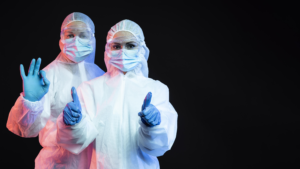One of the great challenges for managers in clinics and hospitals is to prevent infections caused by contaminating agents, such as bacteria, viruses and other microorganisms. To this end, these professionals resort to PPE equipment, materials that make it possible to perform procedures safely and effectively. In addition, maintaining proper care with health equipment can make all the difference in this process.
Personal protective equipment (PPE) for health is so essential in these establishments provided for in regulatory standards. NR 32, for example, deals with the necessary measures to combat occupational diseases and guarantee appropriate working conditions for employees. Managers, of course, play an important role in achieving these goals. Health equipment is essential for quality treatment of patients.
What is the importance of hospital PPE?
As we know, hospitals and clinics are environments that require extra attention, not only with cleanliness, but also with the correct use and disposal of materials. After all, the danger of contamination in these establishments is great and, to prevent this from happening, it is necessary to strictly follow the current safety standards.
Among the main generators of infections in health institutions are chemical and biological risk agents, in addition to ionizing radiation and contamination by waste, inadequate cleaning and lack of maintenance in machines and equipment. Therefore, the use of hospital PPE is an effective form of combat.
What are the main PPE equipment in healthcare?
PPE must be used in all activities where it is not possible to eliminate the risk of occupational diseases. Therefore, the offer is an obligation of the employer, be it a hospital or a clinic. That said, find out below which are the main health PPE equipment and what they are for!
- Gloves
Most procedures performed in healthcare require the use of disposable gloves to protect the hands, one of the main means of contracting infections. This item is even suitable for handling contaminants.
- Protective glasses
Protective glasses need to be used when there is a risk of excretions or secretions splashing on the employee. Thus, this hospital PPE protects the eyes from chemical components, among others.
- Apron
The apron is used, mainly, in surgical practices, and should be for single use, therefore individual. Its function is to serve as a barrier against secretions and substances that are harmful to health. Items made of cotton must be overlaid with a waterproof material. Such equipment protects both the professional’s clothing and skin.
- Surgical mask
Used in several procedures, the surgical mask is a hospital PPE that combats biological risk accidents. In addition, it prevents the transmission of diseases through fluids during the contact of health professionals with the patient.
- Cap
In addition to protecting professionals from contaminating components, the cap prevents hair loss when performing tasks. For this reason, it is a very important hospital PPE in healthcare facilities.
- Mask with chemical filter
This health PPE is indicated for professionals who need to handle toxic chemical substances — germicides with strong odors, for example. As its name suggests, it protects the body against the effects of chemicals.
- PFF2/N95 mask
This type of mask is recommended for protection against specific diseases, as it completely prevents agents that are harmful to health and present in the air from accessing the airways of health professionals.
It prevents, for example, the transmission of chickenpox, measles, tuberculosis, severe respiratory syndromes and COVID-19, caused by contact with the Sars-CoV-2 virus.
- Acrylic face shield
The acrylic facial protector must be used in laboratories, during the mechanical cleaning of hospital instruments (purges and sterilization center, for example) and even in the necropsy sector.
It is made of this material to allow perfect vision during procedures. Such PPE equipment protects the entire face, including the side. Therefore, it must be adapted to the professional’s face.
By reading this article, you became aware of the relevance of using hospital PPE and quality equipment in healthcare environments.
For more information, follow us on Facebook and LinkedIN.


